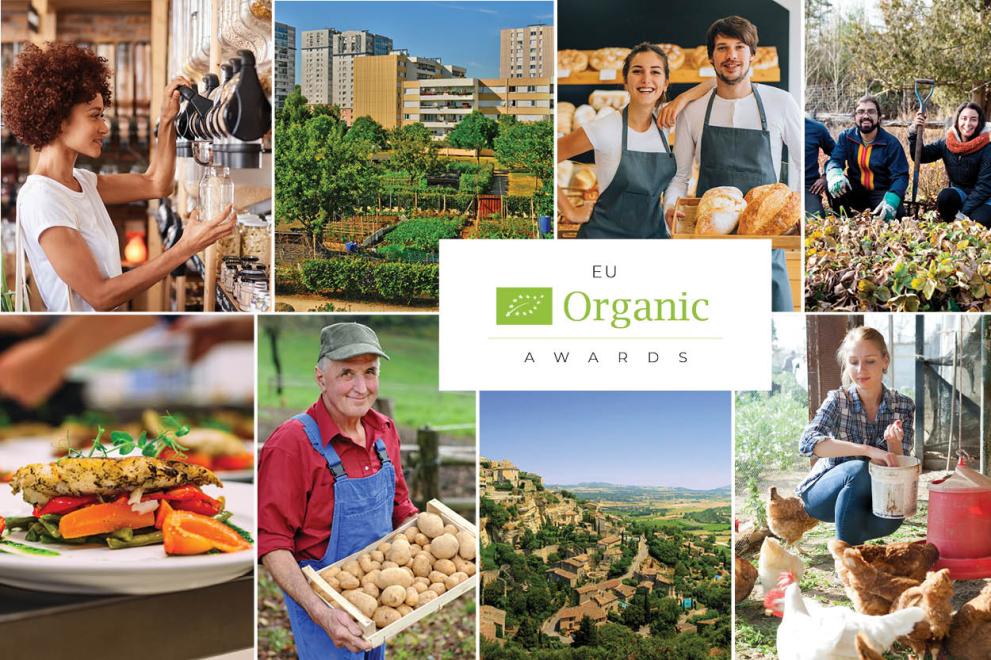
The finalists were selected from a pool of close to 100 applications from all over Europe, with a higher presence of Central European and Baltic entries compared to last year.
The winners will be announced at the official award ceremony to be held in Brussels on 25 September.
The EU Organic Awards were first launched in 2022 as part of a commitment made in the Action Plan for the Development of Organic Production with the objective of recognising excellence all along the organic value chain, from farmers to restaurants, from SMEs to bio-districts. Building on last year’s experience, the EU organic awards scheme comprises 7 categories and 8 individual awards. They acknowledge excellent, innovative, sustainable and inspiring projects producing real added value for organic production and consumption.
The awards are jointly organised by the European Commission, the European Economic and Social Committee, the European Committee of the Regions, COPA-COGECA and IFOAM Organics Europe. The jury for the awards is composed of representatives from these organisations, as well as from the European Parliament and the Council of the EU.
The awards competition is open to any actor or institution along the organic value chain with an excellent, innovative, sustainable and replicable project contributing to greater accessibility and affordability of organic products in the EU. The jury selects the winners in each category by judging their projects against the horizontal award criteria.
The finalists in each category are as follows:
Best organic farmer (female)
- Małgorzata Pucer (Pasiekapucer) - Barciany, Poland
- Céline Clenet (La Casseline) - Cassel, France
- Clara Benito Pacheco (Entrelobas) - Serrada de la Fuente, Spain
Best organic farmer (male)
- Roberto Giadone (Natura Iblea) - Ispica, Sicily, Italy
- Thomas Moschos (Moschos Farm) – Kastoria, Greece
- Mikhaylo Haliv (Tomelloso) - Ciudad Real, Spain
Best organic region
- Dordogne, France
- Centre-Val de Loire, France
- Burgenland, Austria
Best organic city
- BioStadt Bremen, Germany
- Hajdúnánás, Hungary
- Stadt Wien, Austria
Best organic “bio-district”
- Bio Região de S. Pedro do Sul, Viseu district, Portugal
- Idanha-a-Nova, Beira Baixa, Portugal
- Biodistretto della Via Amerina e delle Forre, Civita Castellana, Italy
Best organic food processing SME
- Fürstenhof GmbH - Finkenthal, Germany
- The Merry Mill - Vicarstown, County Laois, Ireland
- Ekološka kmetija Kukenberger – Trebnje, Slovenia
Best organic food retailer
- Valle y Vega Cooperativa Agroecológica de Granada - Churriana de la Vega, Andalucia, Spain
- Gut Wulksfelde– Tangstedt, Hamburg, Germany
- NaturaSì Conegliano – Conegliano, Veneto, Italy
Best organic restaurant/food service
- Luftburg - Kolariks Freizeitbetriebe GmbH - Vienna, Austria
- Trnulja Country Estate - Ljubljana, Slovenia
- Biohotel St. Daniel - Štanjel, Slovenia
Further information about the candidates, the selection criteria, and the awards in general can be found on the EU Organic Awards webpage.
Background
Increasing organic farming, aquaculture and production makes a significant contribution to reducing the use of chemical fertilisers, pesticides and anti-microbials. It has a positive effect on our climate, the environment, biodiversity and animal welfare. It can also contribute to fair farmer incomes and rural development. That is why organic production has been identified as playing a key role in the delivery of the objectives set out in the European Green Deal, and the Farm to Fork and Biodiversity strategies.
For this reason, the Commission has set a target of 25% of EU agricultural land being under organic farming by 2030, in addition to a significant increase in the level of organic aquaculture. To support this, the Commission adopted the Action Plan for the Development of Organic Production (known as the Organic Action Plan) in March 2021.
The plan contends that in order to stimulate organic production, consumer demand for organic products needs to grow. This requires greater public awareness of the characteristics and benefits of organic production. Out of this, the EU organic awards were conceived as a means to increase public awareness of organics.
Details
- Publication date
- 18 July 2023
- Author
- Directorate-General for Agriculture and Rural Development
- Location
- Brussels
